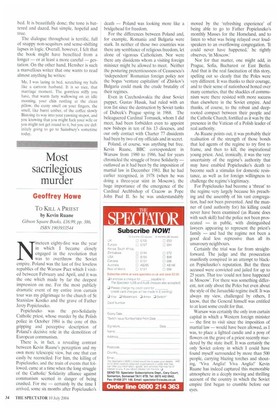Most sacrilegious murder
Geoffrey Howe
TO KILL A PRIEST by Kevin Ruane Gibson Square Books, £16.99, pp. 386, ISBN 1903933544 Nineteen eighty-five was the year in which I became closely engaged in the revolution that was to overthrow the Soviet empire. Poland was the last of five loveless republics of the Warsaw Pact which I visited between February and April, and it was the one which made by far the deepest impression on me. For the most publicly dramatic event of my entire iron curtain tour was my pilgrimage to the church of St Stanislaw Kostko and the grave of Father Jerzy Popieluszko.
Popieluszko was the pro-Solidarity Catholic priest, whose murder by the Polish police in October 1984 is the core of this gripping and perceptive description of Poland's decisive role in the demolition of European communism.
There is, in fact, a revealing contrast between Kevin Ruane's perception and my own more telescopic view, but one that can easily be reconciled. For him, the killing of Popieluszko, and the train of events that followed, came at a time when the long struggle of the Catholic/ Solidarity alliance against communism seemed in danger of being crushed. For me — certainly by the time I arrived, some six months after Popieluszko's death — Poland was looking more like a bridgehead for freedom.
For the differences between Poland and, for example, Romania and Bulgaria were stark. In neither of those two countries was there any semblance of religious freedom, let alone of vigorous Catholicism. Nor were there any dissidents whom a visiting foreign minister might be allowed to meet. Neither the posturing pretentiousness of Ceausescu's 'independent' Romanian foreign policy nor the bogus 'venture capitalism' of Zhivkov's Bulgaria could mask the crude brutality of their regimes.
Even in Czechoslovakia the dour Soviet puppet, Gustav Husak, had ruled with an iron fist since the destruction by Soviet tanks of Dubcek's Prague spring in 1968. The beleaguered Cardinal Tomasek, whom I did meet, had been forbidden even to appoint new bishops in ten of his 13 dioceses, and our only contact with Charter 77 dissidents had been by two of my officials and in secret.
Poland, of course, was anything but free. Kevin Ruane, BBC correspondent in Warsaw from 1980 to 1986, had for years chronicled the struggle of brave Solidarity — outlawed as it had been by the imposition of martial law in December 1981. But he had earlier recognised, in 1978 (when he was doing a three-year stint in Moscow), the huge importance of the emergence of the Cardinal Archbishop of Cracow as Pope John Paul II. So he was understandably moved by the 'refreshing experience' of being able to go to Father Popieluszko's monthly Masses for the Homeland, and to listen to what was being relayed over loudspeakers to an overflowing congregation. 'It could never have happened,' he rightly observes, 'in Moscow.'
Nor for that matter, one might add, in Prague, Sofia, Bucharest or East Berlin. And that is the real fascination of this story, spelling out so clearly that the Poles were very different. It was thanks to their courage, and to their sense of nationhood honed over many centuries, that the shackles of communism were there resisted with more success than elsewhere in the Soviet empire. And thanks, of course, to the robust and deeprooted compact between their people and the Catholic Church, fortified as it was by the presence in the Vatican of a Polish leader of real authority.
As Ruane points out, it was probably their realisation of the strength of those bonds that led agents of the regime to try first to frame, and then to kill, the inspirational young priest. And, ironically, it was the very uncertainty of the regime's authority that may have enabled Popieluszko's death to become such a stimulus for domestic resistance, as well as for foreign willingness to challenge the regime's legitimacy.
For Popieluszko had become a 'threat' to the regime very largely because his preaching and the assembly of his vast congregation, had not been prevented. And the manner of (and authority for) his killing could never have been examined (as Ruane does with such skill) had the police not been prosecuted — in public, with distinguished lawyers appearing to represent the priest's family — and had the regime not been a good deal less repressive than all its unsavoury neighbours.
Certainly the trial was far from straightforward. The judge and the prosecution manifestly conspired in an attempt to blacken Popieluszko's reputation. But the three accused were convicted and jailed for up to 25 years. That too 'could not have happened in Moscow'. For there was something different, not only about the Poles but even about the style of the Jaruzelski regime itself. It was always my view, challenged by others, I know, that the General himself was entitled to at least some credit for that.
Warsaw was certainly the only iron curtain capital in which a Western foreign minister — the first to visit since the imposition of martial law — would have been allowed, as I was, to place a lighted candle and a posy of flowers on the grave of a priest recently murdered by the state itself. It was certainly the only Soviet colony in which I could have found myself surrounded by more than 500 people, carrying blazing torches and shouting, 'Viva Anglia! Viva Anglia!' Kevin Ruane has indeed captured this memorable atmosphere in a deeply moving and thrilling account of the country in which the Soviet empire first began to crumble before our eyes.


























































 Previous page
Previous page